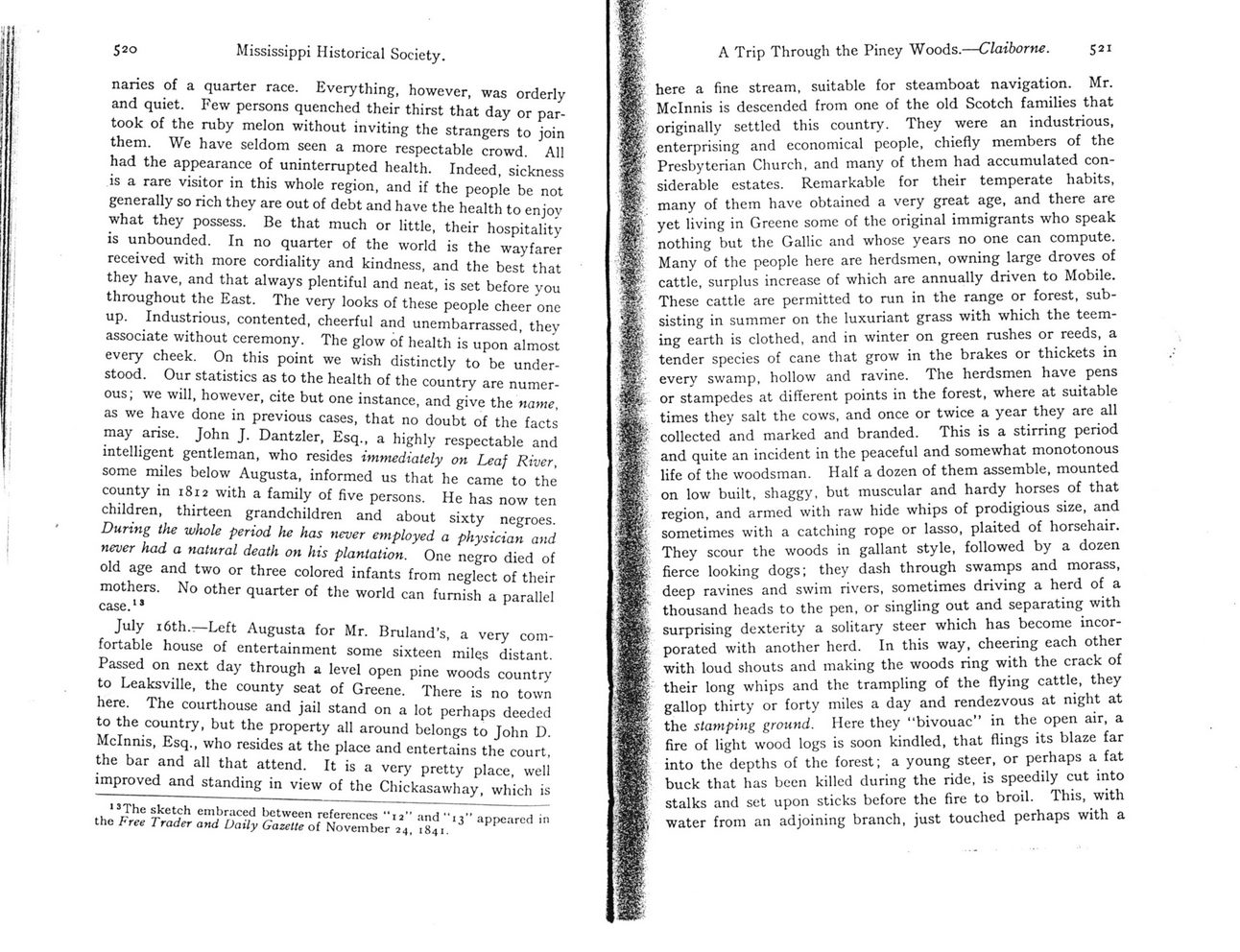This text was obtained via automated optical character recognition.
It has not been edited and may therefore contain several errors.
52? Mississippi Historical Society. naries of a quarter race. Everything, however, was orderly and quiet. Few persons quenched their thirst that day or partook of the ruby melon without inviting the strangers to join them. We have seldom seen a more respectable crowd. All had the appearance of uninterrupted health. Indeed, sickness is a rare visitor in this whole region, and if the people be not generally so rich they are out of debt and have the health to enjoy what they possess. Be that much or little, their hospitality is unbounded. In no quarter of the world is the wayfarer received with more cordiality and kindness, and the best that they have, and that always plentiful and neat, is set before you throughout the East. The very looks of these people cheer one up. Industrious, contented, cheerful and unembarrassed, they associate without ceremony. The glow of health is upon almost every cheek. On this point we wish distinctly to be understood. Our statistics as to the health of the country are numerous; we will, however, cite but one instance, and give the name, as we have done in previous cases, that no doubt of the facts may arise. John J. Dantzler, Esq., a highly respectable and intelligent gentleman, who resides immediately on Leaf River, some miles below Augusta, informed us that he came to the county in 1812 with a family of five persons. He has now ten children, thirteen grandchildren and about sixty negroes. During the whole period he has never employed a physician and never had a natural death on his plantation. One negro died of old age and two or three colored infants from neglect of their mothers. No other quarter of the world can furnish a parallel case.15 July 16th.?Left Augusta for Mr. Bruland?s, a very comfortable house of entertainment some sixteen miles distant. Passed on next day through a level open pine woods country to Leaksville, the county seat of Greene. There is no town here. The courthouse and jail stand on a lot perhaps deeded to the country, but the property all around belongs to John D. Mclnnis, Esq., who resides at the place and entertains the court, the bar and all that attend. It is a very pretty place, well improved and standing in view of the Chickasawhay, which is ? ^cet?h em braced between references "n? and "n" aDne-ired in the bree Trader and Daily Gazette of November 24, ,841. P[ A Trip Through the Piney Woods.?Claiborne. 521 here a fine stream, suitable for steamboat navigation. Mr. Mclnnis is descended from one of the old Scotch families that originally settled this country. They were an industrious, enterprising and economical people, chiefly members of the Presbyterian Church, and many of them had accumulated considerable estates. Remarkable for their temperate habits, many of them have obtained a very great age, and there are yet living in Greene some of the original immigrants who speak nothing but the Gallic and whose years no one can compute. Many of the people here are herdsmen, owning large droves of cattle, surplus increase of which are annually driven to Mobile. These cattle are permitted to run in the range or forest, subsisting in summer on the luxuriant grass with which the teeming earth is clothed, and in winter on green rushes or reeds, a tender species of cane that grow in the brakes or thickets in every swamp, hollow and ravine. The herdsmen have pens or stampedes at different points in the forest, where at suitable times they salt the cows, and once or twice a year they are all collected and marked and branded. This is a stirring period and quite an incident in the peaceful and somewhat monotonous life of the woodsman. Half a dozen of them assemble, mounted on low built, shaggy, but muscular and hardy horses of that region, and armed with raw hide whips of prodigious size, and sometimes with a catching rope or lasso, plaited of horsehair. They scour the woods in gallant style, followed by a dozen fierce looking dogs; they dash through swamps and morass, deep ravines and swim rivers, sometimes driving a herd of a thousand heads to the pen, or singling out and separating with surprising dexterity a solitary steer which has become incorporated with another herd. In this way, cheering each other with loud shouts and making the woods ring with the crack of their long whips and the trampling of the flying cattle, they gallop thirty or forty miles a day and rendezvous at night at the stamping ground. Here they ?bivouac? in the open air, a fire of light wood logs is soon kindled, that flings its blaze far into the depths of the forest; a young steer, or perhaps a fat buck that has been killed during the ride, is speedily cut into stalks and set upon sticks before the fire to broil. This, with water from an adjoining branch, just touched perhaps with a

Claiborne, J.F.H Claiborne-J.F.H-028